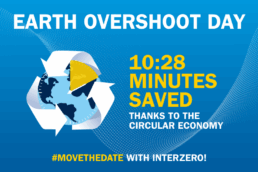
Environmental Debt Day? A little later - thanks to Interzero!
On 24 July, we celebrated Environmental Debt Day 2025 and for us at Interzero, this day perfectly symbolises what drives us. This year, too, we are moving EOD (Earth Overshoot Day) forward with our circular solutions. However, we are not achieving this alone, but together with our customers and partners - because "climate protection is a team sport". Achieving an even greater impact, however, requires more than that: better structural conditions for a circular economy and an alliance of politicians, business and society - a true team for resource conservation.
The Ecological Debt Day on 24 July 2025 marks the day when humanity has consumed more from nature than our planet can regenerate in a whole year. This year we will reach this day eight days earlier than last year. But it is not inevitable. Calculations Global Footprint Network, based on research resources SAVED carried out by Fraunhofer UMSICHT, show that the emphasis on a circular economy makes sense: together with customers and partners, Interzero is moving the Environmental Debt Day forward by more than 10 minutes - worldwide.
Although humanity has been living in ecological debt since the end of July, Interzero impressively demonstrates that a functioning closed-loop economy has a positive impact on resource conservation and climate protection. Every recycled pack, every reused electrical appliance and every properly collected battery reduces the demand for primary resources and is an important step towards our vision of a world without waste.
Mathis Wackernagel: "Over the past years, we have been refining our assessments of how Interzero's operations are reducing global environmental growth. Our latest calculations confirm that the company, together with its customers, has succeeded in moving Environmental Debt Day forward by several minutes. This means that Interzero is truly changing reality: the more it does, the smaller the global achievement of ecological debt."
Plastics as a key resource
Interzero sees plastics as a particularly important lever in postponing Environmental Debt Day. More than 50 per cent of the primary raw materials saved come from recycling of plastic packaging, especially lightweight packaging (LWP). However, the return and recycling of lightweight packaging not only has a large impact on volume within the Dual system, but the savings in this area are particularly high.
Improved and unified rules of the game
However, the potential is far from exhausted. In addition to consumer decisions by individuals or better waste separation, better structural framework conditions and the promotion of innovation are needed above all to pull the great lever that is the circular economy. There are a number of action points: expanding separate collection systems, introducing new extended producer responsibility (ROP) schemes at an early stage, consistently implementing sustainable public actions and prioritising recyclable packaging. A deposit system for batteries and accumulators can also contribute to improving safety across the industry. A clear policy framework is needed to promote technological innovation and guarantee investment in a circular economy.
Sybilla Merian: 'The ideas are here - strong, effective, forward-looking. Committed people, bold projects and innovative technologies are already making the circular economy a real game changer. But more is needed to anchor this change in the long term: we need to rewrite the rules of the game - boldly, collectively and with a future worth living in in mind.
Environmental Debt Day shows us that we are living beyond our means. But we can take action - with a team that is fully committed to making the circular economy work.
Let's #MoveTheDate. From Interzero.
Note on calculation methodology:
Global Footprint Network bases its calculations on a resource accounting tool called the Ecological Footprint. Using this data, the non-profit organisation compares humanity's or the population's current demand for resources with the Earth's capacity for biological regeneration. Most of the data for estimating Interzero's contribution to resource conservation comes from the study 'resources SAVED by Recycling' conducted by the Fraunhofer Institute for Environment, Safety and Energy Technology UMSICHT. Once a year, Interzero commissions these scientists to determine the amount of greenhouse gases and resources saved through our company's activities.